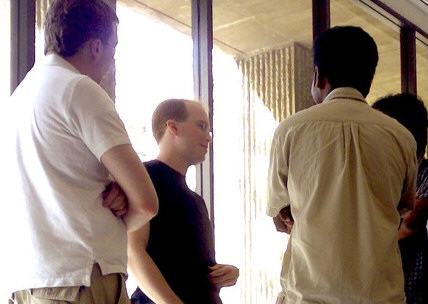
Creative Commons-licensed by jm3
"I think, in general, people are uncomfortable with things that are different. Even now when I talk about adding new features to Gmail, if it isn't just a small variation or rearranging what's already there, people don't like it. People have a narrow concept of what's possible, and we're limited more by our own ideas about what's possible than what really is possible. So they just get uncomfortable, and they kind of tend to attack it for whatever reason."
(Paul Buchheit, the creator of Gmail)
Paul Buchheit is the man behind Gmail, the first and the most successful AJAX web application from Google.
On April 1, 2004, we rolled out the first release of Gmail. It immediately became known for giving away 1000 MB of storage, while the others only offered 4 MB, as they had for many years. We didn't do that just for the attention (although we certainly got our share). It's just part of our philosophy. We always want to do as much as we can for our users, and so if we can make something free, we will.
But storage was only the most obvious difference, and our other improvements were just as important. Gmail included a quick and accurate search. It introduced powerful new concepts to organize email, such as the conversation view (so now I can finally see all those replies at once). It provided a fast and dynamic interface from web browsers everywhere, popularizing the techniques that have since become known as AJAX.
This interface included many important features not commonly found on the web at that time, such as email address auto-completion, a slick spell-checker, keyboard shortcuts, and pages that update instantly. It included a smart spam filter to get rid of junk mail. Finally, we made an important new promise: you can keep your Gmail address and all of your email, even if you someday decide that Gmail is not for you. Cell phone owners already have the right to keep their old phone number when switching to a new provider, and you should have that same freedom with email. To ensure this freedom, Gmail provides, for free, both email forwarding and POP download of all your mail. Many services are now beginning to include other Gmail innovations; we hope that some day they will also be willing to include this one.
But Gmail managed to make other competing email services improve.
Mr. Buchheit said he started working on Gmail after observing that other email programs were getting worse, not better. Microsoft's Mr. Doerr said that at his company, Gmail was a thunderbolt. "You guys woke us up," he told Mr. Buchheit. Yahoo's Mr. Diamond, then at a startup with its own hot, new email program, [OddPost, now known as Yahoo Mail Beta] said Gmail was the final impetus that Yahoo needed to buy his company.
Mr. Buchheit responded with a victory lap. "We were trying to make the email experience better for our users," he said. "We ended up making it better for yours, too."
"Paul was one of the first engineers at Google. Among other things, he came up with the idea for PigeonRank. Oh yeah, and Gmail, which he largely built himself in the middle of the night. Paul liked to get to the office after noon or even at dinnertime, then work on into the next morning," recalls an ex-Googler. He also wrote the original prototype of Google AdSense and came up with Google's mantra: "Don't be evil". He joined Google in 1999, but he left the company last year because his life there became "too predictable, and too typical." But you can find him at his blog where he still talks a lot about Google.